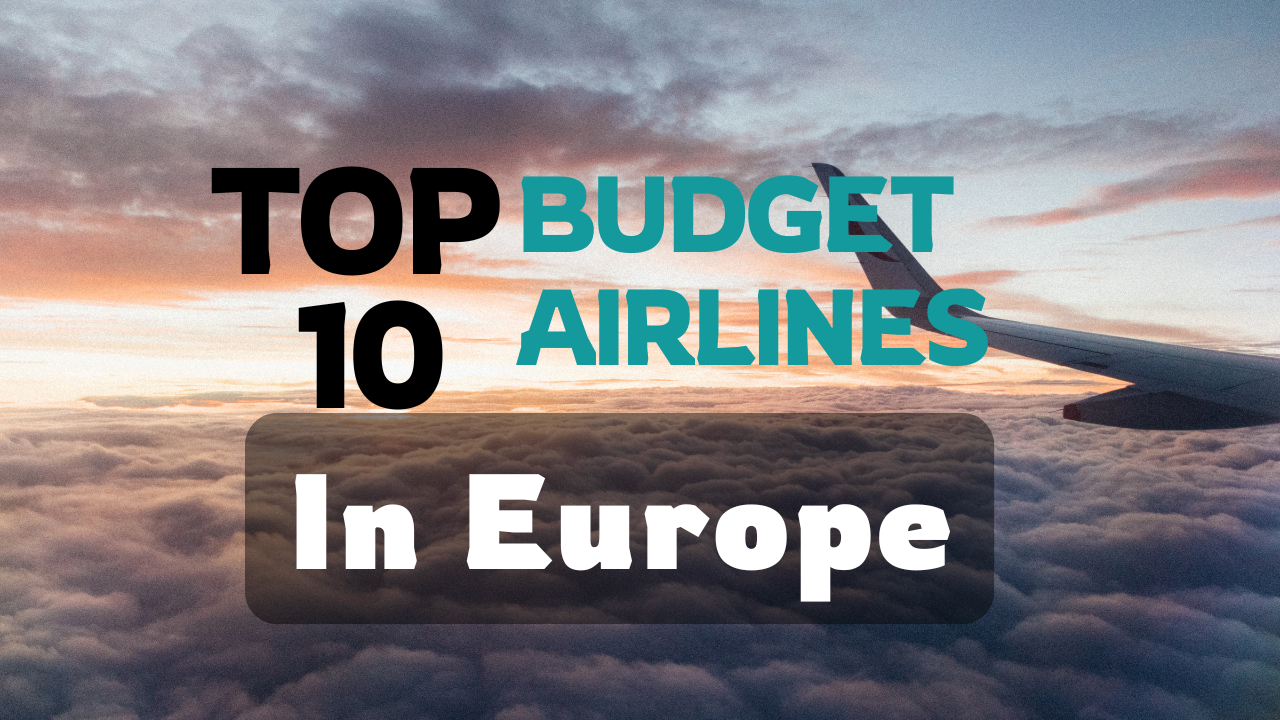Europe's Best Ultra Low-Cost Airline Carriers In 2026
Let's explore the cheapest way to fly around Europe by looking at the top ultra low-cost airlines in 2026—their routes, destinations, and the number of countries they serve.

Europe is the best region in the world for cheap air travel, with countless ultra low-cost airlines letting you hop from country to country for a fraction of what it costs in the United States—often so affordable that it’s not just faster than driving but, many times, even cheaper.
Dozens of low-cost carriers run short, frequent routes that often take under two hours—perfect for weekend getaways, multi-city itineraries, and pairing flights with trains or buses to reach lesser-known regions.
Why Europe is So Cheap to Hop Around
- Short stage lengths: Many flights are 45–120 minutes, keeping fares low.
- Multiple airports per city: Secondary airports reduce costs and expand availability.
- High competition: Dozens of carriers compete on popular routes, driving frequent sales.
Quick reality check: ultra-low base fares rarely include more than a personal item. Expect to pay extra for a standard carry-on, seat selection, priority boarding, and checked baggage.
Let's take a look at ten of the best budget airlines servicing Europe.
Top 10 Budget Airlines in Europe
Ryanair
Europe’s biggest budget airline with an enormous point-to-point network across the continent—especially handy for hopping between secondary airports and lesser-known cities.
- Known for: tons of routes, frequent sales, ultra-low base fares
- Pros: huge coverage, multiple flights per day on popular city pairs, easy to snag deals if you’re flexible
easyJet
A low-cost carrier that mostly flies into primary airports—quicker into city centers and often smoother connections for onward travel.
- Known for: big presence in the UK, France, Italy, Switzerland
- Pros: primary airports, solid on-time performance, wide schedule on busy routes
Wizz Air
A go-to for Central/Eastern Europe—plus a growing footprint into the Middle East and North Africa—built around point-to-point routes from multiple bases.
- Known for: very low fares from cities like Budapest, Warsaw, and Bucharest
- Pros: strong coverage in Eastern Europe, lots of secondary city links, frequent promos
Vueling
Barcelona-based and part of IAG—great for Spain domestic hops and short-hauls around Western/Southern Europe with easy Avios tie-ins.
- Known for: Spain and Mediterranean routes, Avios earning via Vueling Club
- Pros: strong Barcelona and Rome networks, simple app/UX, handy for Iberia/British Airways collectors
Volotea
Focuses on small and mid-sized European cities—lots of seasonal routes that skip big hubs entirely.
- Known for: city pairs you won’t see elsewhere
- Pros: direct flights between “under-the-radar” regional airports, summer-friendly schedules
Pegasus Airlines
Istanbul Sabiha Gökçen–based—great bridge between Europe and the Middle East/Caucasus with easy onward connections.
- Known for: wide regional reach beyond Europe
- Pros: competitive fares via SAW, good bank of connections east and south, modern fleet
Norwegian Air Shuttle
Short-haul focused within Europe—clean cabins, friendly vibe, and Wi-Fi on many aircraft.
- Known for: Scandinavia base strength, straightforward product
- Pros: good fares on Nordic routes, free Wi-Fi on many flights, solid city-pair frequency
Transavia
Air France–KLM’s low-cost arm—perfect for Western Europe to sunny getaways in Southern Europe and North Africa.
- Known for: Dutch and French bases feeding holiday routes
- Pros: easy pairing with KLM/AF itineraries, strong leisure schedule, straightforward booking
Jet2
UK leisure specialist—great for Mediterranean beaches and ski gateways, with package-style reliability.
- Known for: friendly service and generous baggage options compared to ultra-low-cost norms
- Pros: excellent seasonal schedules from UK regional airports, clear pricing, beach/ski focus
Eurowings
Part of the Lufthansa Group—bigger network logic and interline options when you want more structure for multi-leg trips.
- Known for: Germany bases and pan-Europe coverage
- Pros: access to Lufthansa Group ecosystem, wide city selection, transparent fare bundles
Europe's Budget Airline Comparison
| Airline | Number of Destinations | Number of Routes | Number of Countries Served |
|---|---|---|---|
| Ryanair | 229 | 2600 | 37 |
| easyJet | 166 | 1200 | 38 |
| Wizz Air | 137 | 800 | 42 |
| Vueling | 101 | 1000 | 28 |
| Volotea | 107 | 450 | 18 |
| Pegasus Airlines | 156 | 280 | 52 |
| Norwegian Air Shuttle | 128 | 344 | 36 |
| Transavia | 89 | 409 | 24 |
| Jet2.com | 75 | 570 | 24 |
| Eurowings | 144 | 414 | 36 |
Tip: A $30 base fare can become $80+ once you add a carry-on, seat selection, and airport check-in fees. Always compare total trip cost, not just the sticker price before planning on who you will book with.
Hidden Fees to Watch
- Bag policies: Lowest tiers often include personal item only; a standard cabin bag can cost extra.
- Seat selection: Window/aisle picks and extra-legroom seats come with a fee.
- Check-in/boarding: Some airlines charge if you don’t check in online or need a boarding-pass reprint.
- Food & drink: Rarely included; prices onboard are higher than you’d expect for a short hop.
Special Deals & Memberships
- Flash sales: One-way fares for $10 or less do happen—often midweek and during shoulder/off-season windows.
- Memberships: Several carriers offer discount clubs or “fly as you like” passes (e.g., Wizz’s unlimited-style option). The savings can be real if you fly those airlines a lot—but extras still apply.
Pro move: Sign up for Jetsetter Alerts to catch huge flash sales (including mistake fares) the moment they happen.
Booking Tips for Budget Airlines
Best time to book
For short-haul budget carriers, the sweet spot is often 2–3 months before departure—the “Goldilocks window.” For peak seasons (summer, school breaks, winter holidays), aim 4–6 months out.
Compare widely
Use flight comparison tools (or search engines you trust) to scan dates, nearby airports, and carriers. Look for fare calendars and price-trend hints to time your purchase.
Stay flexible
Flying Tue/Wed is often cheaper than weekends. Early-morning or late-night flights can undercut daytime options. Consider alternate airports—many European cities have two or more.
Weigh comfort vs. cost
Under two hours, bare-bones is usually fine. For 3+ hour routes (e.g., Canary Islands, Scandinavia), you may value a roomier seat, snack, or more generous bag policy—sometimes a slightly pricier carrier wins on overall value.
Don’t ignore legacy carriers
Full-service airlines sometimes match or beat ULCCs on short-hauls, especially in promos or off-peak periods—and they often include at least a drink/snack and better baggage rules.
Final Tip:
Book Cheap A Transatlantic Flight, Then Hop Around Europe On Budget Carriers
If you're starting in the United States, Jetsetter Alerts hunts down the cheapest transatlantic fares so you arrive in Europe for hundreds less—then you can string together low-cost hops across the continent. Sign up never miss the best deals.
